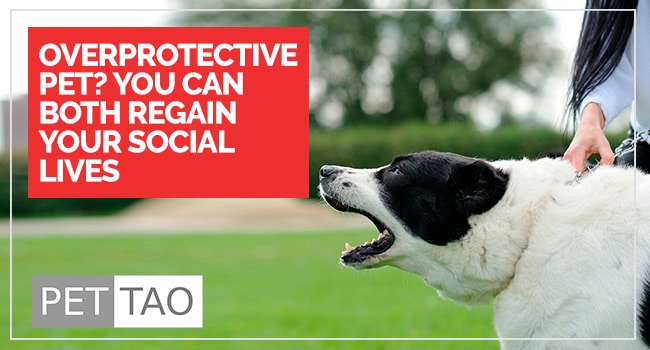“Down boy!”
“No, Fido! Stop!”
“Can you leave the package on the steps? I can’t let him out…”
“I’m sorry, he’s just so protective of me…”
Does this scenario sound familiar?
Having an aggressive dog causes issues.
You can’t invite people over. You can’t take your dog outside.
Worst of all, everyone involved is under extreme stress.
Gosh, wouldn’t it be nice to spend a relaxing day at the dog park with your furry friend?
You know your pup is a sweet, loving companion. But, when other people or animals approach, he becomes a monster!
To solve this problem, you must first learn why your pet is overprotective.
Why is my pet overprotective?
Pets can be overprotective for many reasons and may display aggressive behavior.
These reasons include, but are not limited to:
- You project fearful or submissive energy. This projection causes your pet to take charge to keep you safe.
- You don’t provide enough exercise, discipline, and affection in proper ratios. To the pet, you are just a source of food and love who needs protection.
Overprotective energy makes you and your pet feel out of control. Who likes feeling out of control?
How can I help my pet become more secure?
What does an overprotective dog look like?
The quality of life for you and your pet is decreased. You two are socializing less with others, and both of you are fearful.
When you have an overprotective dog, there may be a desire to lock him away to prevent hostile interactions. This act is not beneficial to the dog, which is a social animal. Of course, you’d like to show off your furry best friend!
Another option is to force your dog to socialize. But, without proper guidelines, this can put your pet, strangers, and you in danger, ultimately leaving you no choice but to avoid social situations.
So, what can you do with an aggressive dog or behavior?
Have patience. The first step is to have patience
If you have an aggressive dog, then it is important to have patience with them. You and your furry friend will need to relearn behaviors.
Take control. The second step is to take control
When you are training your dog to socialize, be in control of the environment. Make sure you are somewhere safe for you and your pet.
As the owner, be patient, but assertive
For example, Your dog looks to you for guidance on how to behave. If your energy is nervous, your dog will assume that he needs to protect you. If your energy is submissive or shy, your dog will assume dominance.
For example, if you become nervous before company comes over out of fear that your pup will act out, he will pick up on this energy and become nervous himself, resulting in aggression. Control of your feelings will result in control of your dog’s emotions.
Take your pooch for a walk
Dogs are energetic pack animals. As such, it is important for them to receive both exercise and socialization. An excellent way to integrate both is to take your pup for a walk with friends.
Having a friend nearby will keep you calm, which will calm your pup.
Additionally, dogs enjoy walking as a pack. This will help your pup associate company with something they enjoy. Furthermore, dogs are less likely to be aggressive after exercise, because they are tired.
Reward good behavior
If your dog senses your anxiety before company arrives, and then gets banished to the laundry room once your guests enter your home, he will have a negative association with the company.
But, if you remain calm before the company arrives, he will be calm as well.
Give your pet a reward/distraction when expecting company
A chew toy may help them work out their anxiety and calm down an aggressive dog.
Once your guests are at the door, distract/reward your pup with a treat. It needs to be a good treat so you may have to bring out the cooked chicken.
You can give some snacks to your guest to give your pup, so he associates their presence with a reward.
Consult a veterinarian who practices Traditional Chinese Veterinary Medicine (TCVM)
Western veterinarians treat anxiety as a neurosis or emotional issue.
TCVM practitioners view anxiety as a physical problem reflecting disturbances in the pet’s Shen. In TCVM, the Shen is the place where happiness and well-being arise.
A TCVM vet can create a treatment plan for your pup that may include calming herbs and/or acupuncture.
Call in a professional
Some pups need more work than the average owner is capable of providing. A professional can help you learn tips and tricks that are safe for you and your pet.
Why an overprotective pet is a serious problem
The ultimate question to ask yourself is: What are the consequences of enabling your overprotective pet which may result in aggressive dog behavior?
The consequences can include:
- Injury to yourself, your dog, other people or animals
- Inability to have company in your home
- Inability to bring your pet out of the house
- Lower quality of life for you and your pet.
Although your pet can protect you when you’re in danger, he should not be in a state of constant“high alert.”
By addressing your overprotective pet’s anxiety, you can bring about a sense of balance and harmony.








